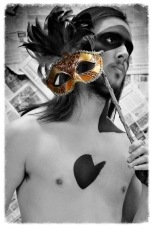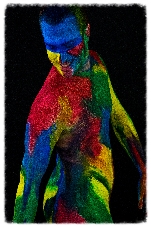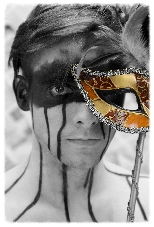WRITTEN BY PETER WRIGHT | PHOTOGRAPHY BY SKYLER A. HAINES | MAKEUP DESIGN BY SCOTT B. RANDALL
The word love is said a lot, but do those who say it actually mean it? When we’re young, the word love is often used to describe a favorite thing.
I love this song! I love that movie!
As we get older, the word love takes on more meaning. Love becomes directed toward other people rather than things. We’ve loved family members, of course, but as we mature, love becomes romantic.
But we must first deal with the complication of lust.
It is easy to confuse lust with love. Feelings we have toward others—especially when we’re young—are wonderful and fun to express. They are also scary and confusing. We don’t yet grasp the difference between lust and love, so we mistakenly assume that initial attraction is love.
Love takes time, love is patient. Lust is immediate, lust is impulsive.
This is even more true when it comes to loving yourself. Loving others is easy; loving yourself, not so much.
Society gives us many examples of flawlessness through images of beautiful models in magazines, actors in movies and TV, fashion shows, music videos, even animated characters. We see these perfected examples and then examine them against the imperfections we see in the mirror.
Unless your narcissism rivals that of the Greek character from whom the word was derived, chances are the you glimpsed in the mirror is not the same you society sees. Maybe you think your nose is too big, your smile too wide or perhaps your thighs. Maybe you wish your brown eyes would turn blue or your curly hair a little more wavy instead. Maybe you wish you had more hair!
But is the mirror to blame for magnetizing these glaring flaws? Or is society?
There has long been a cultural trend to search for that perfect look. Plastic surgeons have made a living off that trend for years. Far too many actresses now have faces that don’t move; that can’t express. Some faces are stretched so wide in the quest to lose wrinkles that their faces are now frozen in time; a surprised expression that is, ironically, expressionless.
Lift.
Pull.
Stretch.
Erase.
Women aren’t the only ones who do this, either. Male celebrities are just as guilty of it. Balding heads are given a surprisingly new volume of hair overnight. The wrinkles of time disappear, leaving behind a plastic face. Oh yes, Botox isn’t just the curse of females.
Everyone has masks that they wear. Some are facades that hide our appearance (real or perceived), some were placed by society and distort our views. Some are happy, others are sad. Some are expressionless.
It is easy to hide behind a disguise; to slip it on and walk around pretending. The desire to hide who you truly are is a complex fixation. Some might accuse a person who is obsessed with changing themselves of low self-esteem, and that may very well be true. But where does that originate? Are the flaws we see in ourselves born in us or do they come from outside of us?
Maybe the first mask placed on us comes from society. We see those skinny models in magazines, the airbrushed photos of our favorite celebrities, the before and after pictures thrown at us by weight loss companies and gyms. Society tells us how we should look and suddenly we’re wearing those green glasses Dorothy and her friends were given as they entered the Emerald City. Sure, through those green-tinted spectacles, everything in the Emerald City fit the description. But what would Dorothy and her friends have seen if they’d taken the glasses off?
These societal lenses show us a perfection that is impossible to replicate—at least until Photoshop is invented for mirrors. The flaws found in the mirror are magnified when seen through the lenses of society’s mask. The reflection doesn’t match society’s definition of perfection so the desire to change what is actually seen becomes overpowering.
Social media plays a heavy hand in this, too. Anonymity allows people the opportunity to bully and critique without anyone even knowing who they are. A different kind of mask: anonymity.
Eventually, you feel like a marionette attached by strings to the puppet master of society. The strings are pulled, jerking you toward one trend or another, one look or another, one desire or another. This is what you should want, this is what you should look like, this is what should excite you!
All this madness drives people to sadness. When perfection isn’t reached, self deprecation begins. The trick is to shed the mask society forces us to look through and realize that society’s suggestions of perfection are impossible.
Learn to love yourself, flaws and all. Redefine perfection as that beautiful reflection in the mirror. Then begin that search for the person whose idea of perfection fits what you see in yourself. Only then can the sadness disappear and the happiness begin.







